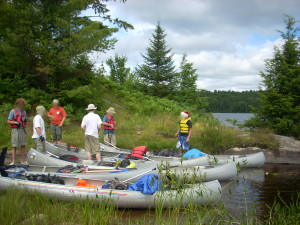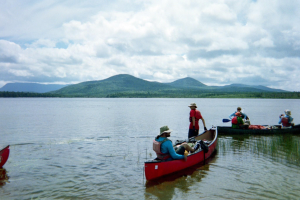In this story regarding a near-tragedy during a 2015 Northern Tier canoe trek, it is stated that the Northern Tier “guide” made a mistake by taking the crew too close to a waterfall, with the entire crew ultimately being swept over the falls with their canoes, leading to multiple injuries and the loss of two of three canoes.

However, who actually is to blame? The Northern Tier participant guide states as follows regarding the responsibility and duties of the Northern Tier interpreter (who is intentionally not called a “guide”):
“When you arrive at Northern Tier, your crew will be greeted by a wilderness canoe counselor known as an Interpreter. The Interpreter will join your crew and stay with the group for the entire wilderness canoeing expedition and lead you through the first day orientation/outfitting procedures before you hit the trail. The Interpreter is an adult male or female who has been trained as a BSA National High Adventure Base Staff member. The Interpreter provides training support, interprets outdoor skills and acts as a resource person to the crew leader, the crew and the adult advisors. In an emergency or any situation involving safety, the Interpreter will act in conjunction with the adult advisors (emphasis added). The Interpreter is not a “fishing guide” but acts as a resource person for the skills pertaining to Scout camping and wilderness canoeing. He or she is a specialist with the equipment and food carried on canoe trips. The Interpreter has been trained in the history of the canoe country and special safety practices to be observed on a wilderness canoe trip.”

Yes, perhaps the Interpreter in the above story may have erred in failing to advise the crew to maintain a safe distance between the entry to the waterfall, and the crew. Alternatively, the water flow may have contributed to the crew’s inability to maintain a safe distance.
However, the responsibility for any tragedy that results from that error in judgment does not fall solely on the Northern Tier Interpreter, if at all.
Indeed, nothing in the above statement suggests that the overall responsibility for safe conduct of the crew is delegated to the Interpreter, as tempting as that may be for inexperienced adult advisors, who may have a tendency to look to the possibly more experienced Interpreter for guidance.
Adults attending Northern Tier (or any other high adventure program where a staff member may be assigned to the crew for an extended period of time, including council-sponsored high adventure treks, Philmont, and Florida Sea Base), should not lose sight of the fact that they, and only they, are ultimately responsible for the health and welfare of the youth in their custodial care, not a camp staff member. The duty of care owed to the unit’s participants by the unit’s adult leaders cannot be surrendered to others.
Lack of experience by adults in the type of event in which the crew is participating is no excuse when adequate judgment must be exercised.
The answer is not to place the responsibility on someone else, the answer is to ensure that participating adults have the necessary experience and technical skills to exercise the requisite judgment under the circumstances. 
However, it appears, according to some stories, that a number of participating adults are placed in a position of responsibility for which they may not have the desired experience and technical skills, leading to an undesirable outcome. A situation to avoid for sure!
Safe Scouting!
